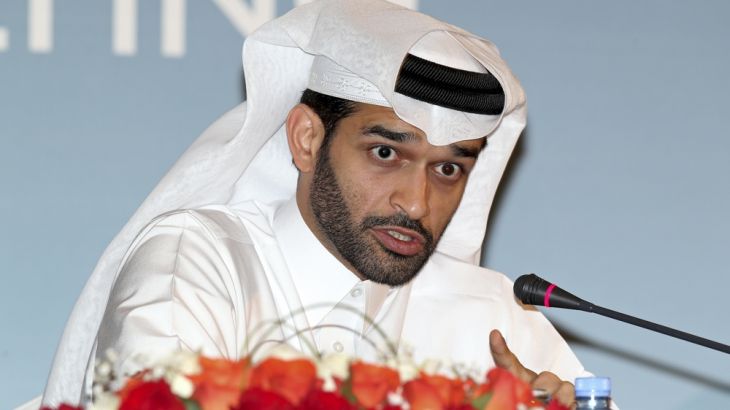
Hassan al-Thawadi: World Cup a tool to fight terrorism
The secretary-general of the Qatar 2022 Supreme Committee on the fallout of the GCC crisis and his World Cup vision.
Despite the ongoing GCC crisis and the blockade of Qatar approaching its third month, Qatar’s authorities insist that it’s business as usual.
But regular import routes for food and building material into Qatar have been closed since June 5th, when several countries, including Bahrain, the United Arab Emirates, Egypt, and Saudi Arabia cut ties with Qatar.
Keep reading
list of 4 itemsCristiano Ronaldo scores winner in record 200th game for Portugal
Kylian Mbappe informs PSG he will not extend contract: Media
Qatar World Cup: Watchdog says FIFA’s carbon-neutral claims false
The World Cup is the perfect tool to genuinely fight and stop the supply of terrorists to terrorist organisations.
So what is the impact of the Gulf crisis on the massive infrastructure projects that are under way to prepare for the 2022 FIFA World Cup?
According to Hassan al-Thawadi, the secretary-general of the Qatar 2022 Supreme Committee, the impact has been minimal. “We have very quickly, moved on to plan B, found alternative sources of supply as well as alternative routes of supply … Projects are on schedule, no delays have occurred,” he tells Al Jazeera.
Meanwhile, the anti-Qatar campaign continues to intensify, with Saudi Arabia and the United Arab Emirates reportedly paying lobbyists to demand that FIFA withdraws Qatar’s right to host the 2022 World Cup. They accuse Qatar of sponsoring “terrorism”, allegations that Qatar continues to deny.
“We were victims and the subject of a smear campaign, but we have always addressed it, always addressed our critics face to face … We intentionally looked to separate politics from sports,” he says.
“The State of Qatar’s commitment in the combat against terrorism is evident and unwavering … Qatar recognises very clearly that there is a fight against terrorism and then there is a responsibility to prevent the environment that is conducive for extremist ideologies that leads to terrorist activities.”
Thawadi explains that prevention can only be done through supporting educational initiatives as well as creating economic stability and job opportunities.
“The World Cup is the quintessential opportunity, the quintessential platform for the region. Major sports events have that power … The World Cup has the ability to be an economic engine, or at least contribute to an economic engine through a sports-integrated economy. It has the opportunity to support the skills development and … human capacity development for the youth of the region, it has the capability of creating jobs,” Thawadi says.
“The World Cup is the perfect tool to genuinely fight and stop the supply of terrorists to terrorist organisations, through utilising the true benefit and true potential of the World Cup.”
Thawadi stresses that Qatar 2022 will be the first World Cup in the Middle East and the Arab World, so “that in itself allows for the Middle East to showcase itself to the outside world; showcase our richness in culture, our richness in heritage, our sense of humour – a lot of people are actually not aware that we have a fantastic sense of humour – and to show the diversity … In a time of divisiveness … we need every opportunity to celebrate our differences and promote our common humanity.”